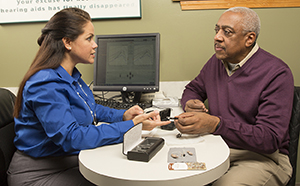A
B
C
D
E
F
G
H
I
J
K
L
M
N
O
P
Q
R
S
T
U
V
W
X
Y
Z
Click a letter to see a list of conditions beginning with that letter.
Click 'Topic Index' to return to the index for the current topic.
Click 'Library Index' to return to the listing of all topics.
Tinnitus (Ringing in the Ears)
Tinnitus is the term for a noise in your ear not caused by an outside sound. The noise might be a ringing, clicking, hiss, or roar. It can vary in pitch. It may be soft or very loud. For some people, this is a minor problem. But for others, the noise can make it hard to hear, work, and even sleep. When tinnitus can't be cured, treatments may help.
What causes tinnitus?
Loud noises, hearing loss, and earwax can cause tinnitus. So can certain medicines. Large amounts of aspirin or caffeine are sometimes to blame. In many cases, the exact cause of tinnitus is not known.
How is tinnitus treated?
 |
| Treatment may include maskers and hearing aids. |
Finding and removing the cause is the best way to treat tinnitus. So your healthcare provider may refer you to an ear, nose, and throat healthcare specialist (ENT or otolaryngologist). Your hearing may also be checked by a hearing specialist (audiologist). If you have hearing loss, wearing a hearing aid may help your tinnitus. When the cause can't be found, the tinnitus itself may be treated. Some of the treatments are listed below. Your healthcare provider can tell you more about them:
-
Maskers.These are small devices that look like hearing aids. They have a pleasant sound that helps cover up the ringing in your ears. Hearing aids and maskers are sometimes used together.
-
Medicines that treat anxiety and depression. These may ease tinnitus in some people.
-
Hypnosis or relaxation therapy. This may help head noise seem less severe.
-
Tinnitus retraining therapy. This combines counseling and maskers. Both can help take your mind off the tinnitus.
To learn more
-
American Speech-Hearing-Language Association 800-638-8255 www.asha.org
-
American Tinnitus Association 800-634-8978 www.ata.org
-
National Institute on Deafness and Other Communication Disorders 800-241-1044 www.nidcd.nih.gov
Online Medical Reviewer:
Ashutosh Kacker MD
Online Medical Reviewer:
Rita Sather RN
Online Medical Reviewer:
Tara Novick BSN MSN
Date Last Reviewed:
3/1/2022
© 2000-2024 The StayWell Company, LLC. All rights reserved. This information is not intended as a substitute for professional medical care. Always follow your healthcare professional's instructions.